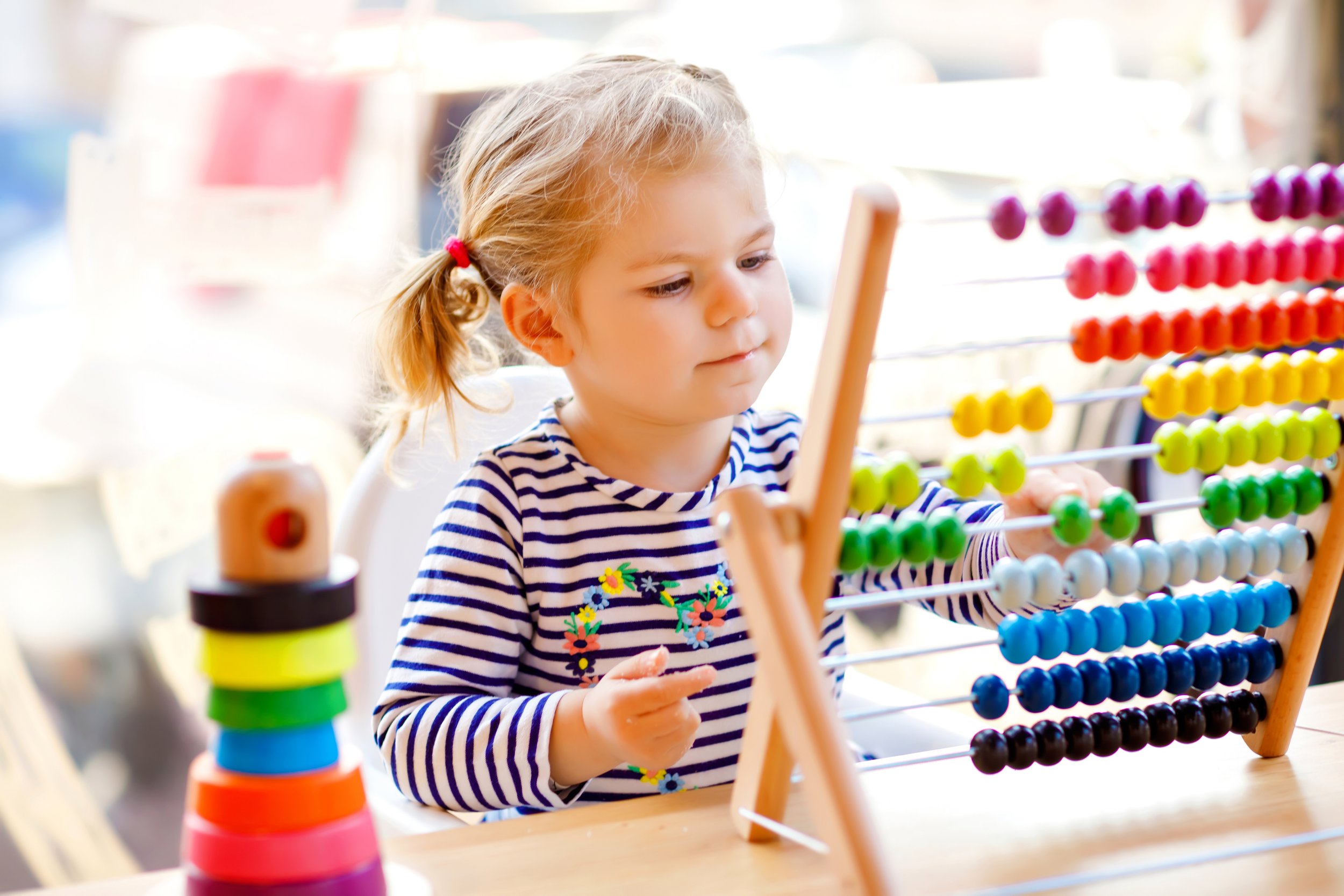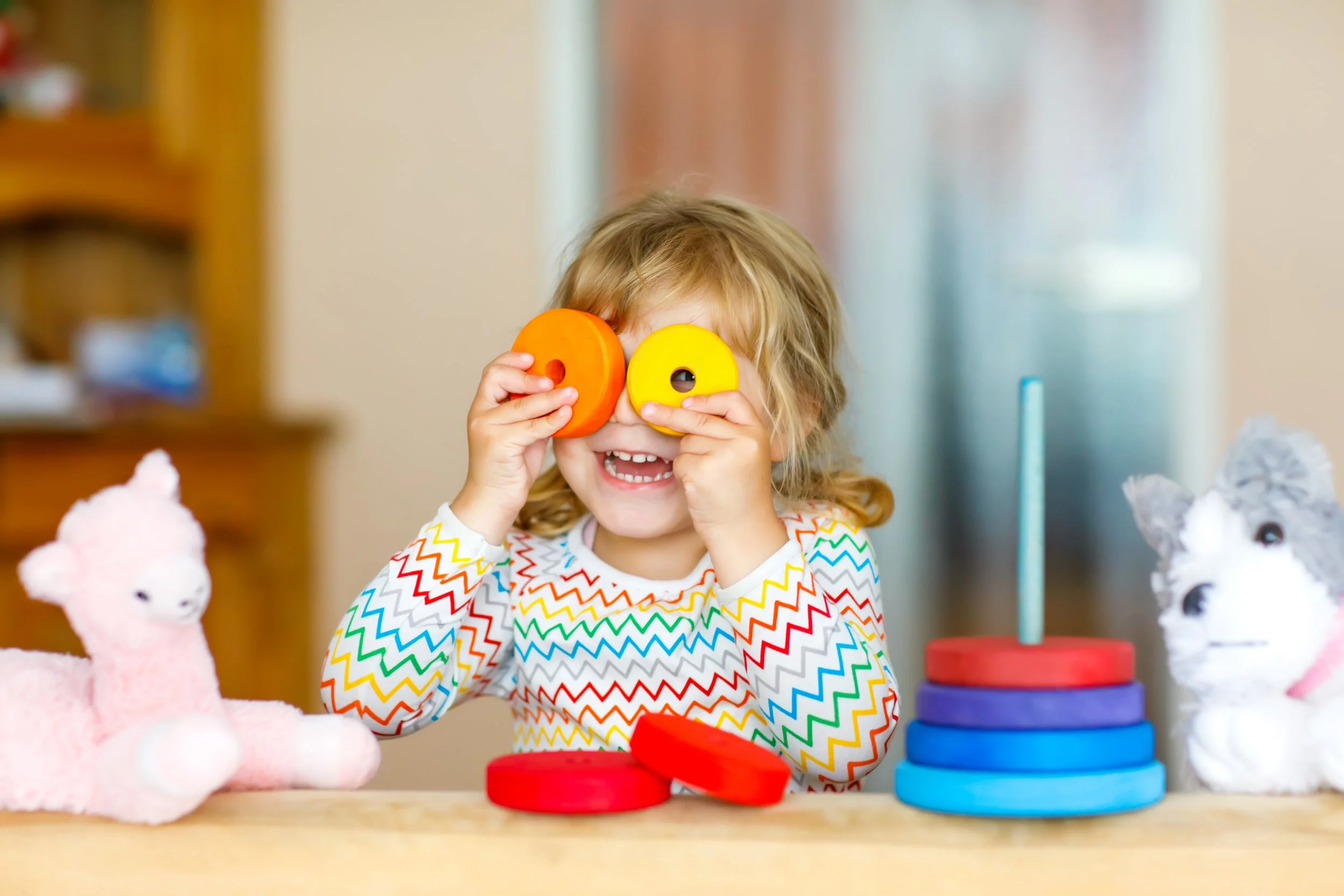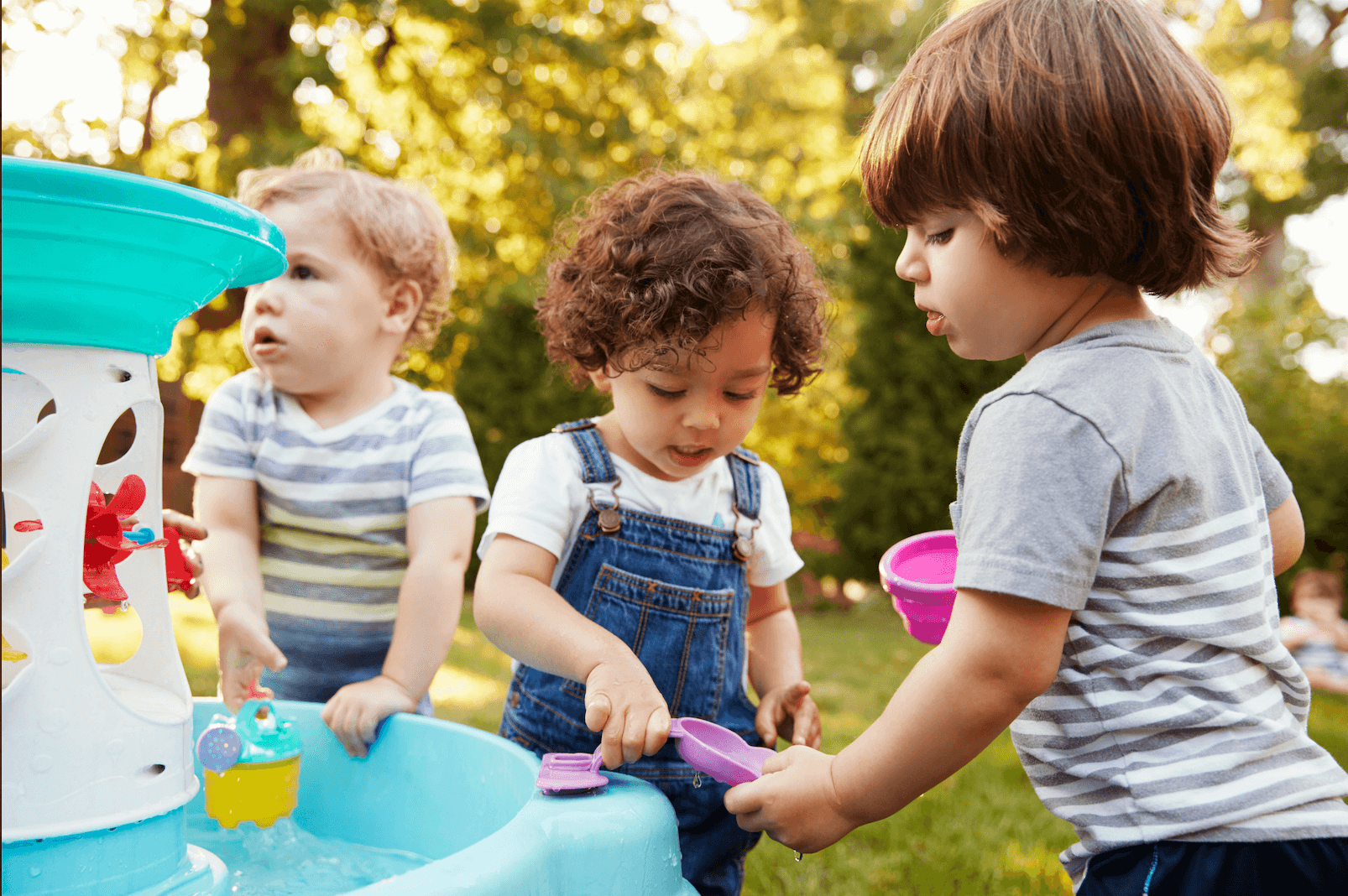How many words should my child have?
As a speech therapist, “How many words should my toddler be saying?” is a question I am asked daily by parents of 1 and 2 year olds.
In this week’s post I’ll teach you:
By the end my hope is that you’ll feel a little more confident in answering the question behind the how many words question: Is my child on track? and what you can do to support them at home.
To help you keep track of your child’s vocabulary size, we created the free Vocabulary Checklist. I am including it here in case you haven’t already downloaded a copy.
Ways To Measure Vocabulary Norms - Milestones, Averages, and Expected Ranges
When parents ask how many words their toddler should be saying, it’s important to understand that there is a huge range in what’s expected at any given age. It’s true that every child is developing at their own pace and in their own way. As speech therapists and medical professionals, we use milestones to help us monitor any given child’s development. However, *milestones cannot be used to diagnose a language delay or disorder*. So, if your child is behind in one or even a few milestones, it doesn’t mean that they have a delay or disorder. The purpose of tracking milestones is to determine if further investigation is needed (ASHA, 2024).
A milestone is the lowest number of words that would be expected for a specific age. If a child is saying less words than the milestone, further evaluation is suggested. Different people will use slightly different numbers when looking at vocabulary milestones, (which could be part of the reason why different sources give different milestones), but in general a milestone is determined by what about 90% of children at a specific age have already learned. And like I mentioned before, there is no perfect data set that tells us what 90% of children are doing at a given age, so milestones are truly estimates.
When reading about toddler vocabulary, you may see other numbers too, like an average number of words or the expected range (sometimes you’ll see the phrase typical range).
The average will tell you about how many words a child in the middle of the expected range is saying at a certain age. When it comes to speech therapy, average isn’t as helpful because your child can say less words than average and still be on track. Children often hit developmental bursts where they grow a lot in one specific area, and these happen at different times for different kids. If your child says less words than average, it doesn’t mean they have below average communication!
The expected range tells you the range between the milestone and the largest number of words that a child is likely to say at a certain age. I like to talk about expected ranges to draw attention to the fact that there is a HUGE range in what’s typical for toddlers. But be careful with expected ranges because hearing that top number can draw too much attention to the bigger number and leave you feeling really crummy (hello mom guilt!) when you don’t need to worry at all.
I’ll give one example in context to explain milestones, averages, and expected ranges. Then we’ll leave the average and expected range in the past, and this post will focus solely on vocabulary milestones.
Here’s our example. If you asked: How many words should a 15 month old say? here’s how you can answer the question using milestone, average, and expected range.
The milestone for the number of words is 2 words at 15 months. If a child is saying less than 2 words at 15 months, it *could* be a sign that they would benefit from speech therapy to support their language development. The goal in speech therapy would be to help a child surpass the milestone of 2 words at 15 months.
The average number of words that toddlers say at 15 months is about 20 words. This means that most 15 month olds will say somewhere close to 20 words, but some will say more words and some will say less words.
The expected range for words at 15 months is vast - anywhere from 3 to 100 words is expected. Most 15 month olds will fall between the two ends of this spectrum.
Why the variability in vocabulary milestones?
To answer your question of “How may words should my 18 month old be saying?” (or any other age) you probably turned to Google. You’ve browsed the results, looking at the CDC, the Mayo Clinic website, and probably the Speech Sister’s blog post about how many words toddlers should be saying. It’s human nature to want a clear cut answer to your biggest questions. If you’re like me, it’s frustrating and confusing to find different milestones on different websites. And now you’re left to wonder which one is “right.”
For example, at 18 months here are what a couple of different resources suggest as the milestone for vocabulary development:
CDC - 18 month olds should say "3 or more words besides mama and dada."
Mayo Clinic - The mayo clinic suggests 10 words by 18 months.
Speech Sisters - The Speech Sisters cite The CDC, Mayo Clinic, and The CDIs. They use 10 words as the milestone benchmark at 18 months.
The MacArthur-Bates Communicative Development Inventories is a speech and language assessment of toddler’s vocabulary size that pulls from their extensive standardization research with thousands of children. They state that children at 18 months should say at least 21 words for girls and 16 words for boys from a list 680 specific words.
At Toddler Talk, we say about 18 words by 18 months (KEEP READING, I’ll explain!)
And to spice things up a bit, my grad school speech pathology textbook suggests toddlers should have 50 words by 18 months.
So which is it?
The rationale behind Toddler Talk’s Milestones
Our milestones pull more from the MacArthur Bates Vocabulary Inventories, which have far more research to validate their findings than the other milestones provided (Fenson et al., 2017). We also take information from speech therapy research and literature as The MacArthur Bates Inventories aren’t perfect; they are based on an incomplete vocabulary list (words not on the list are not counted in their reported vocabulary ranges). Because there’s no one perfect source of data for vocabulary milestones, it’s important to know that these milestones are estimates.
And remember, milestones are NOT used to diagnose! Milestones are used to monitor development and decide when a closer evaluation *may* be appropriate.
At Toddler Talk, we believe in being proactive. Why not use vocabulary milestones as a starting point to talk about your child’s development sooner rather than later? A conversation with your pediatrician might show that your child is behind in a few other areas, or maybe everything else is on track, and your doctor will recommend simply keeping an eye on things at home. Either way, our goal is to help parents feel confident in supporting their child’s language development from the start.
If you decide you want to take a closer look at your child’s development, it’s reassuring to know that there is little to no risk in scheduling a speech and language evaluation, which families can do for free in the United States. Since these evaluations often take months to schedule, it’s a good idea to set up an appointment as soon as you notice a potential concern. If your concerns persist, you'll already have the appointment lined up without extra wait time. If your concerns go away, you can always cancel.
One last thing: I’ve included milestone estimates for every age in months because I know you want to see the milestones specific to your baby’s exact age, even if it’s between the more common milestone markers!
Also, keep in mind these milestones are based on children who speak only English. If your child speaks more than one language, be sure to give them credit for words they say in all languages combined and use these milestones with caution.
How many words should my child have?
Now it’s time to talk about vocabulary milestones (how many words 90% of toddlers at a particular age are saying). Remember, different milestones use different data, and none are perfect. These milestones reflect what *in my opinion* are the most appropriate benchmarks to use.
If you are curious about what counts as a word, check out this post before counting your little one’s words.
Toddler Talk Vocabulary Milestones For 1 Year Olds
12 months - 0 words
13 months - 0 words
14 months - 1 word
15 months - 2 words
16 months - 5 words
17 months - 12 words
18 months - 18 words
19 months - 25 words
20 months - 30 words
21 months - 40 words
22 months - 50 words
23 months - 60 words
Counting vocabulary size is a simple and inexpensive way to monitor development at home for children between the ages of 12-23 months. Tracking vocabulary can help you keep track of the new words your child is learning and notice if your child might be falling behind early on.
You can download a free vocabulary tracker here so you can easily keep count over time ↓
A word of caution when it comes to vocabulary!
Keep in mind, vocabulary size is just ONE measure of speech and language development. Observing vocabulary growth along with all the other ways your baby is learning to communicate gives the clearest picture to know if they are “on track.” Research even shows that vocabulary size alone at 2 years old is not a strong predictor of language skills for 3 and 4 year olds, so considering other communication skills is really important. You can see other speech and language milestones for 12 month olds, 18 month olds, and 24 month olds by using the links provided here.
A speech and language evaluation can be scheduled to get a more clear picture of your child’s overall communication development (you can schedule a free evaluation in the US through your state’s early intervention program!).
** Always consult with your child’s pediatrician or another trusted healthcare professional if you have concerns about your child’s development. Vocabulary milestones are estimates. The Vocabulary Tracker is for informational purposes only and should not be used diagnostically - like all other milestones.
Toddler Talk Vocabulary Milestones For 2 Year Olds
Did you know that it’s most common to test a toddler’s vocabulary size around their second birthday?
However, as children move closer to their third birthday the number of words expected increases to several hundred words and counting vocabulary size becomes much less practical. After 2.5 years, it also becomes more important to look at how many words children are putting together, the grammar skills they’ve learned, and their ability to talk in conversations. For this reason, after 30 months I don’t often recommend vocabulary milestones as the best way to track vocabulary at home. I’ll include some other milestones to look out for and a link to our more complete milestones checklists at 30 months and 36 months.
24 months - 60+ words & 2 word combinations
25 months - 100 words
26 months - 120 words
27 months - 150 words
28 months - 180 words
29 months - 220 words
30 months - 260 words & Uses plural -s (dogs, shoes, cars)
31 months - Talks in short sentences
32 months - Continues to learn new words easily
33 months - Uses past tense -ed verbs (walked, played, washed)
34 months - Talks in sentences & parents can understand at least 75% of what is said
35 months - Tells short stories about things that happened to them
You can download a free vocabulary tracker here so you can easily keep count over time ↓
** Always consult with your child’s pediatrician or another trusted health care professional if you have concerns about your child’s development. Vocabulary milestones are estimates. The Vocabulary Tracker is for informational purposes only and should not be used diagnostically.
Do boys say less words than girls?
The short answer here is no. You may find some resources that say boys talk less than girls, and there may be some small differences in vocabulary size. However, research shows that there’s no real significant different in the number of words little boys say compared to little girls. Using the same milestones (aka benchmarks) for boys and girls vocabulary is fine. While milestones don’t differ based on gender, speech and language evaluations may take a closer look at the differences between vocabulary in boys and girls to provide or rule out a language diagnosis.
Speech and Language Delay & Tracking Vocabulary
If your toddler is saying less than about 300 words, it’s a great idea to track their vocabulary regardless of their age. Tracking vocabulary is one way to track your child’s progress if they have a speech or language delay. It can be beneficial to see how many words your child is learning at any given time. If your child suddenly starts learning many new words it may be a sign that they are hitting a language growth burst, and speech therapy can be very effective during this time.
Tracking vocabulary can also help you notice if your child learning new words. This can show you which strategies and activities don’t seem to match your child’s learning style or level, which allows you to adjust your plan. Finding the right strategies and activities to support your little one is one of the keys to success in speech practice.
Toddler Vocabulary Size Recap
Between the ages of 12-30 months, tracking your toddler’s vocabulary size is an easy way to monitor their speech and language development at home.
Listen for their first word during their 13th month
Listen for 5 words around 16 months
Listen for 18 words around 18 months
Listen for 2 word combinations by 24 months
Listen for 100 words by 25 months and 200+ words by 29 months
Use the Toddler Talk Vocabulary Tracker to keep a vocabulary size count at home
You can use the same vocabulary milestones for boys and girls
After 30 months (or about 300 words), shift your focus to grammar and conversational skills as a way to track language development
A quick note about vocabulary for kids 3 years and older:
When toddlers turn 3 years old, it’s expected that they are saying far too many words to count. As a result, it’s more indicative to look at HOW children are using their language skills. For example, listen for a 3 year old to talk in conversations, ask questions, answer questions, and tell simple stories. You can also look for grammar skills to be learn, like present progressive tense -ing verbs (walking, running, playing). And listen for 3 year olds to be understood almost always when they are talking to people they know.
If you have concerns about your 3 year old’s language development, you may consult with their pediatrician or request a free speech and language evaluation through your local school district (in the US).
Other frequently asked questions…
-
Speech is synonymous with pronunciation. A 2 year old’s pronunciation should be at a level that you can understand about 50% of the things they say, or more.
To learn more about 24 month old speech, refer to this blog post.
-
2 year olds learn to say many new words. At 24 months it’s expected that 2 year olds say at least 60 words, and by the time they are 35 months old (almost 3 years old), it’s expected they say far more words than you can count.
-
Vocabulary can be divided into 2 parts: receptive vocabulary & expressive vocabulary.
Receptive vocabulary includes all the words a child can understand. By 24 months old, it’s expected that 2 year olds can understand far more words than they can count, or about 10x as many words as they can say.
Expressive vocabulary includes the words a child can say. At 2 year old’s expressive vocabulary will grow significantly from about 60 words at 24 months to many hundred words at 35 months.
-
Item description
-
No, it’s not expected that a 2 year old knows the ABC’s. While a 2 year old may recite back some of the ABCs from memory (especially in the ABC song), this is a skill most often learned in preschool.
Written By: Stephanie Keffer, MS, CCC-SLP
Recently on the blog…
Works Cited:
ASHA’s developmental milestones: Birth to 5 years. (2024). https://www.asha.org/public/developmental-milestones/
Centers for Disease Control and Prevention. (2022). CDC's Developmental Milestones. Centers for Disease Control and Prevention. Retrieved March 13, 2023, from https://www.cdc.gov/ncbddd/actearly/milestones/index.html
Dale, P. S., Price, T. S., Bishop, D. V. M., & Plomin, R. (2003). Outcomes of early language delay. Journal of Speech, Language, and Hearing Research. https://doi.org/10.1044/1092-4388(2003/044)
Fenson, L., Marchman, V. A., Thal, D. J., Dale, P. S., Reznick, J. S., & Bates, E. (2007). MacArthur-Bates Communicative Development Inventories: User's guide and technical manual. P. B. Brookes.
Hillsberg, B. (2021). How many words should my child have? Speech Sisters. Retrieved March 13, 2023, from https://speechsisters.com/how-many-words-should-my-child-have/
Mayo Foundation for Medical Education and Research. (2023). Speech milestones for babies to look out for. Mayo Clinic. Retrieved March 13, 2023, from https://www.mayoclinic.org/healthy-lifestyle/infant-and-toddler-health/in-depth/language-development/art-20045163
© 2020-2025. Stephanie Keffer Hatleli, MS CCC-SLP. All Rights Reserved.
The content offered on ToddlerTalk.com is for informational purposes only. Toddler Talk is not engaged in rendering professional advice, whether medical or otherwise, to individual users or their children or families. No content on this site, regardless of date, should ever be used as a substitute for direct medical advice from your doctor, speech language pathologist, or other health professional. By accessing the content on ToddlerTalk.com, you acknowledge and agree that you are accepting the responsibility for your child’s health and well-being. In return for providing you with information related to home speech and language practice, you waive any claims that you or your child may have as a result of utilizing the content on ToddlerTalk.com.











Explore language tips for potty training tailored to your child's communication stage. From toddlers who are just beginning to talk to children speaking in sentences, learn how to use gestures, sign language, storytelling, and consistency to support your potty training journey.